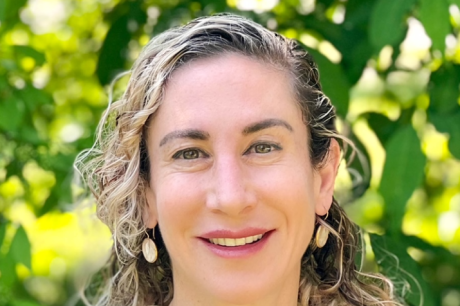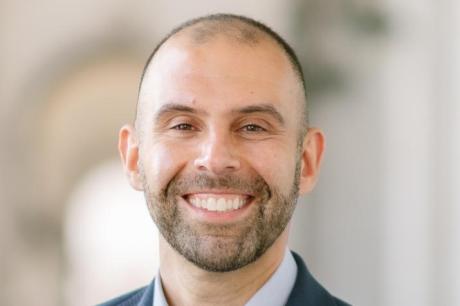Published March 27, 2008, last updated on February 13, 2013 under Education News
Charis Ackerson (nee Lawrenson), BSN ’07, RN, was amazed. She and a local nurse in Barbados had just stepped through the door of a tiny concrete-block house with a corrugated metal roof to check on a diabetic patient. The nurse had measured the patient’s blood sugar level, then led Ackerson to the kitchen.
“She opens the fridge and gets the insulin out,” Ackerson remembers. “But then I see she also looks to see if they’re eating vegetables or high-carb foods. Then she opens their cabinets to see what kind of snacks they are having.”
The moment drove home for Ackerson how crucial such simple, effective preventative measures are in providing low-cost, high-quality health care.
“They had so much to teach us,” she says of the summer cultural immersion trip she took last summer. “They don’t have a lot of money to spend on health care in Barbados, so they really focus on primary prevention.”
Ackerson and her classmates worked alongside the local nurses, providing front-line care at a local polyclinic in the morning, then visiting chronic patients in their homes each afternoon. The nurses quickly treated them as members of the staff, with the near-complete autonomy nurses operate under in Barbados.
“By the second week, they were like, ‘Okay check in the patient, check schedules, answer the phone,’ ” she said. “They are so busy.”
Now, less than five months later, Ackerson is a nurse in the neonatal intensive care unit at Presbyterian/St. Luke’s Medical Center in Boulder, Colo. But she is also looking for community volunteer work to provide prenatal counseling and preventive care to pregnant women in her community, saying, “the whole primary prevention thing – I am really interested in that now.”
Dorothy Powell, director of the School’s Office of Global and Community Health Initiatives, says OGACHI created the summer cultural immersion trips to Barbados, India, Jamaica and Nicaragua, and continued to work with Duke Medicine on trips to Honduras to offer new nurses just such insights – and to raise their awareness of cultural differences.
“To have a Duke experience in Duke facilities is a privileged opportunity to see the best that medical care has to offer anywhere in the world,” Powell says. “But these international experiences show that the majority of health care delivery systems in the world aren’t as privileged. It allows students to contrast what they have here with what other parts of the world don’t have. Yet many of those countries are able to use what they have in effective ways to deal with their problems.”
OGACHI, established two years ago, works closely with Duke’s signature Global Health Institute to increase the number of students who complete such service learning experiences. The School also partners with schools of nursing in the host countries, where in some cases, a local faculty member accompanies students to the site to help them understand what is happening in the health care facilities they visit.
Shannon Russell, BSN ’07, traveled to India with a group to see how residents there receive health care, with a focus on HIV/AIDS prevention. She found a cavernous disparity between the private hospital system for the well-to-do and the government- or charity-run hospitals and clinics open to all.
“The government hospitals had just the bare essentials,” Russell recalls. “It was pretty dirty, and they just don’t have a lot of equipment. They were struggling even to implement universal precautions [to prevent contact with bodily fluids that can transmit HIV]. They were trying, but the resources were so limited.”
In contrast, “when you come to the private hospitals, there was one we went into that was just as good as here, accredited by the same organization that accredits Duke Hospital,” she said. “The problem is the only people who can afford care there are the very wealthy. It was just such a stark contrast.”
Russell said the experience solidified her interest in working with under-served populations. Now she has taken a job at Virginia Garcia Memorial Health Center in Portland, Ore., a primary care center serving migrant farm workers and others with barriers to health care.
“I see how health care is at the root of helping a person have good outcomes in every area of their life, of being able to take care of their family,” she says.
Students go through an orientation before their trips to gain knowledge of the culture and health care system they will visit. A Duke clinical instructor accompanies them. Though students visit host countries with a respectful, humble attitude, ready to learn, they sometimes have chances to share knowledge with their foreign counterparts.
For example, Ackerman gently suggested prioritizing the treatment of a pregnant patient who showed signs of pre-eclampsia, when the local custom is simply to take patients in the order in which they arrive.
“I’m recognizing the symptoms of pre-eclampsia, and they were saying, ‘What time did she get here?’ ”
Ackerman and her classmates also made a parting gift of name badges for the local nurses’ uniforms, to enhance their sense of professionalism and help patients relate to them.
“They loved them and are still wearing them,” she said. “We have stayed in touch.”
Each student has to pay or borrow the cost of his or her trip, around $2,000. Powell is working to raise funds for scholarships to enable more students to participate.
“We certainly are a global society, and we need to be able to understand each other across the continents,” Powell says. “These trips also cause students to examine their own values and deal with their own potential stereotypes or biases. There are so many cultures represented in our own country to whom we provide care. We absolutely must ensure that our students develop cultural competence, sensitivity, and respect for differences.”
This article was originally published by the School of Nursing at http://dusonnet.nursing.duke.edu/foreign-emersion-experience/.


